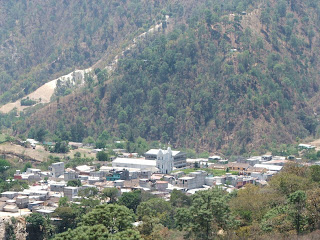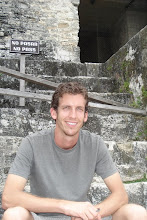Tuesday, June 16, 2009
Life After Capacitación: To San Sebastián...
Our only emotions after swear-in and before moving to our respective sites. In a word: terror.
An aerial view of San Sensebatián (San Se), as seen running up the mountain through a nearby aldea community.
My host-home for the first three months in site - a view of the big garden behind the pila, where I brush my teeth, wash my clothes and do my dishes. Second to the family, the garden was a selling point when I was choosing a place to live once I arrived in site at the end of March.
Juramentación - Swear-in Day, March 27, 2009: The First Day of the Next Two Years
Our Training Director speaking at the Ambassador's residence in Guatemala City, moments before we took the oath and committed to our service in Peace Corps Guatemala.
My Parramos host-mom Doña Berta and me on the Ambassador's grounds.
The families and other PCTs with whom I lived in Parramos for my first three months of training.
The "Healthy Schools" half of my training group and Peace Corps Guatemala Country Director.
Peace Corps Training: My First Three Months in Country
Parramos host-mom Doña Berta - always ready with a joke on hand.
The Catholic Church in Parramos where my host-family attended.
College friend Ben and me, catching up in Antigua, while living in the same country and working in different programs. Small world. Necessary travel buddy.
The outside view of my host-home in Parramos.
Wednesday, June 3, 2009
The Life of Profe Marcos
In the U.S., the name "professor" is an esteemed title to describe a scholar who teaches at the collegiate-level and has completed years of education and various benchmarks on the faculty-ladder. Here, if you’re a teacher, you automatically get the title of "profesor" or "profesora". And though undergoing four years of college and obtaining an undergraduate degree in the U.S. is important to enter into any sort of professional career, when considering the number of people in the U.S. who have post-graduate degrees, an undergraduate degree doesn’t usually deem the initials "B.A." after someone's name. Here, I may be referred to as "licenciado". And despite having a college degree, as a minimum requirement for a Peace Corps Volunteer, I more-than-likely communicate at the level of a first grader.
I’ve completed two months, working in three rural schools. My job as "school health facilitator" seems like it is beginning to evolve as I continue to work and live here. These past two months I’ve been giving health lessons to 26 classes per week among my three schools. More and more, I’m learning: what will work and conversely what will not work, what classes will participate and conversely look at me like I’m speaking a foreign language (sometimes Spanish is foreign, as all the schools are bilingual Mam speaking as well), and which activities are too childish for sixth graders and conversely beyond the capabilities of the completely Mam speaking kindergartners.
Each day lasts from 7:30AM – 12:30PM—piece of cake compared to U.S. school schedules. Nevertheless, my farthest school is an hour-and-a-half away from my site. The alarm goes off at 5:00AM, I revert to my college behaviors and hit the snooze button multiple times and I’m on the road, starting at 5:45AM or 6:00AM. From my site I take a "camioneta" (or converted U.S. school bus) and hop on a "microbus" or "camion" (a flatbed truck that tightly packs many people). The dirt road is bumpy and standing often feels better than absorbing the shock with my shoulders, as I smash into the bars onto which I hold, with every teeter across the rough terrain. We hit some construction on the way and wait for 30 minutes until the road opens back up. The short five hours of school becomes a nine hour day, from wake-up time to the time I return home.
One school, however, is an easy bus ride away, with about five minutes of careful walking, as an attempt not to tumble down rocky hillsides. It’s often a welcome relief to sleep-in a bit and to know that just transporting myself won’t be the hardest part of the day.
Commonly sung songs during my lessons include "Canción de los Piojos" set to the tune of "La Cucaracha," singing about such an eloquent topic as lice, as well as the song, "Con un cepillo, me cepillo yo…," which becomes a sort of jig, using your whole body, demonstrating just how many "toothbrushes" you might use to brush your teeth (two arms, two legs, butt, head, and your whole body). I’m starting to lack taste in real music.
Everyday classes of students range from half-asleep to receptive and participatory, and my confidence fluctuates from that of despair to feeling successful. Such is Peace Corps—you never know what will happen next!
I’ve completed two months, working in three rural schools. My job as "school health facilitator" seems like it is beginning to evolve as I continue to work and live here. These past two months I’ve been giving health lessons to 26 classes per week among my three schools. More and more, I’m learning: what will work and conversely what will not work, what classes will participate and conversely look at me like I’m speaking a foreign language (sometimes Spanish is foreign, as all the schools are bilingual Mam speaking as well), and which activities are too childish for sixth graders and conversely beyond the capabilities of the completely Mam speaking kindergartners.
Each day lasts from 7:30AM – 12:30PM—piece of cake compared to U.S. school schedules. Nevertheless, my farthest school is an hour-and-a-half away from my site. The alarm goes off at 5:00AM, I revert to my college behaviors and hit the snooze button multiple times and I’m on the road, starting at 5:45AM or 6:00AM. From my site I take a "camioneta" (or converted U.S. school bus) and hop on a "microbus" or "camion" (a flatbed truck that tightly packs many people). The dirt road is bumpy and standing often feels better than absorbing the shock with my shoulders, as I smash into the bars onto which I hold, with every teeter across the rough terrain. We hit some construction on the way and wait for 30 minutes until the road opens back up. The short five hours of school becomes a nine hour day, from wake-up time to the time I return home.
One school, however, is an easy bus ride away, with about five minutes of careful walking, as an attempt not to tumble down rocky hillsides. It’s often a welcome relief to sleep-in a bit and to know that just transporting myself won’t be the hardest part of the day.
Commonly sung songs during my lessons include "Canción de los Piojos" set to the tune of "La Cucaracha," singing about such an eloquent topic as lice, as well as the song, "Con un cepillo, me cepillo yo…," which becomes a sort of jig, using your whole body, demonstrating just how many "toothbrushes" you might use to brush your teeth (two arms, two legs, butt, head, and your whole body). I’m starting to lack taste in real music.
Everyday classes of students range from half-asleep to receptive and participatory, and my confidence fluctuates from that of despair to feeling successful. Such is Peace Corps—you never know what will happen next!
Subscribe to:
Comments (Atom)








.JPG)
.JPG)


